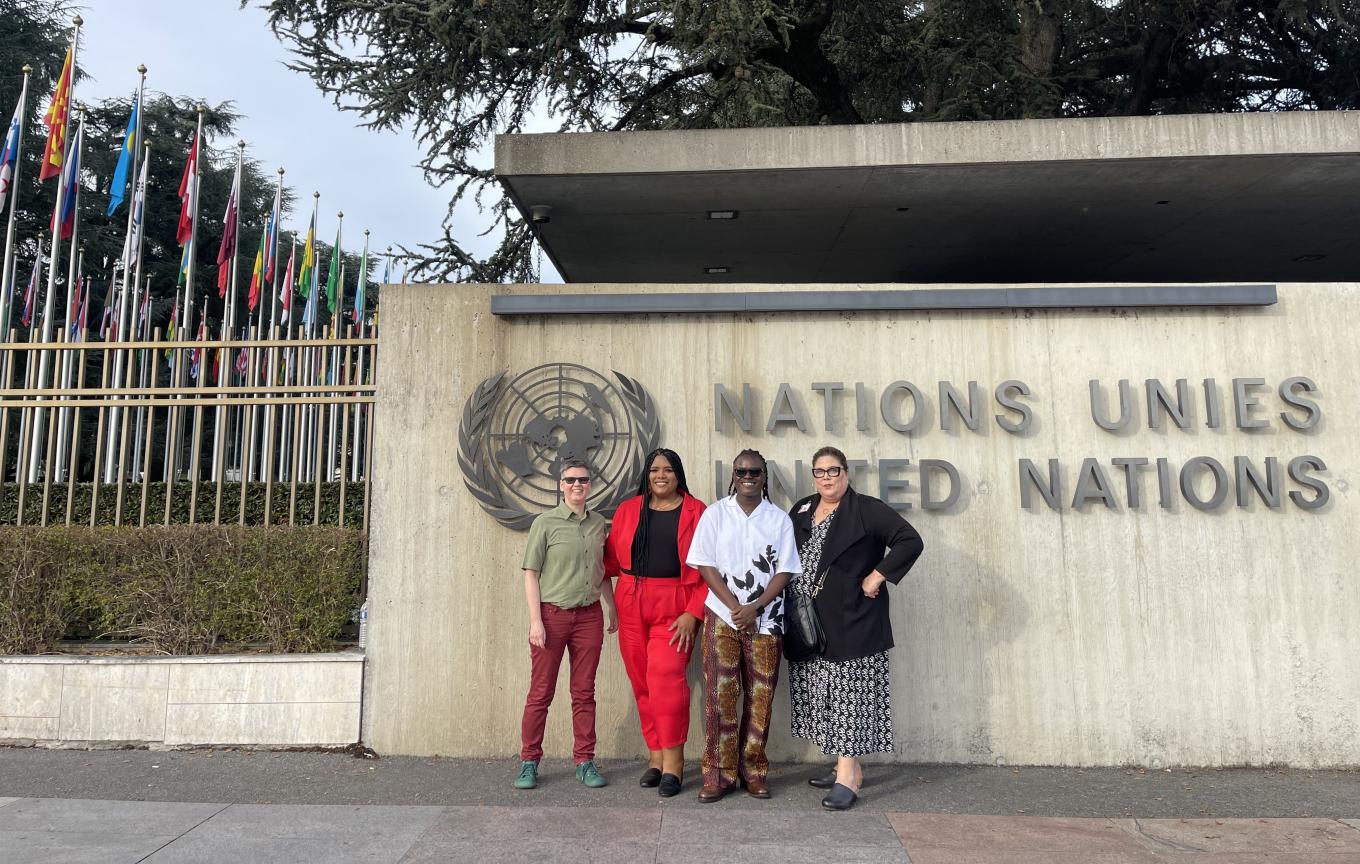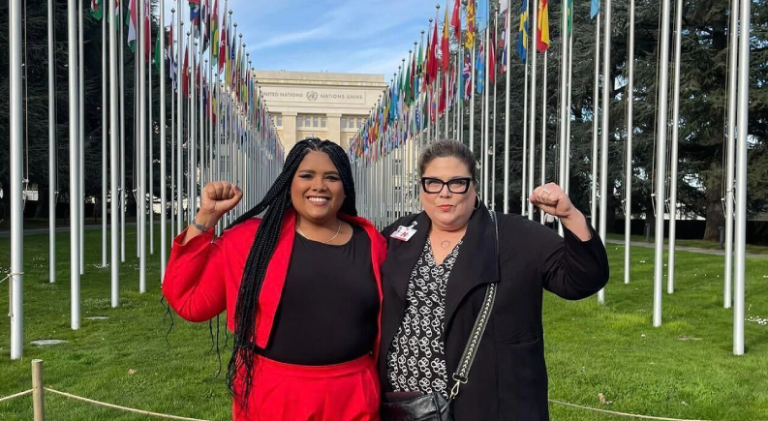
Insights
Reflections on Advocating for the First-Ever United Nations Intersex Human Rights Resolution
Region(s)
Type
Commentary
Author(s)
Publish Date
April 4, 2024
Share
The distant snow-capped mountain peaks presented a stark contrast to the greening grass and flowering trees in the foreground as I gazed out the window of the Bar du Serpent in the United Nations Palais de Nations in Geneva. A curious name for a room that was not a “bar” as I knew one to be back home in the United States, but more of a large gathering spot with floor-to-ceiling windows, multiple sitting areas, and a small counter area to get snacks, coffee and, I guess, beer if you were so inclined. But nobody was drinking beer: espresso seemed to be the drink of choice, which makes sense when you consider that everyone there was working tirelessly to advance global human rights. I was no exception, having flown across the ocean to join three other courageous intersex persons to pass the first-ever resolution combating discrimination, violence, and harmful practices against intersex persons at the 58th UN Human Rights Council.
Sitting around a large low round table, myself representing Outright International with fellow human rights defenders Crystal Hendrix from South Africa, Obioma Chukwuike from Nigeria, and Kaisli Syrjanen from Finland, we were engaging in difficult conversations with representatives from a few UN member states who were telling us that our bodies are disordered and in need of medical expertise, and not an appropriate issue to be addressed at the Human Rights Council.
During those meetings, espresso in hand, I found myself slipping away several times, focusing on the majestic view of the Alps against the crisp blue sky and reminding myself how far we have come. A little over ten years ago, none of us at that table were speaking about being intersex, to say nothing of advocating at the United Nations. The four of us, female and nonbinary identified, were bravely speaking truth to power around that table and at the microphone during so-called informal sessions discussing the proposed resolution. Together expending emotional labor by sharing our personal difficult stories in hopes of changing hearts and minds towards ending the discrimination, harmful medical practices, and other forms of violence suffered by our community all over the globe.

Activists in front of UN Geneva
Nearly ten years ago, in September of 2015, I traveled to the UN in Geneva for the very first time, invited as the sole intersex representative from North America for an Expert Convening organized by the Office of the UN High Commissioner for Human Rights. About five other intersex activists representing other global regions participated along with representatives of various UN bodies and institutions. We shared our stories of lived experiences. We represented diverse backgrounds and perspectives, but all shared the common experience of being harmed as infants and children by non-emergent irreversible medical practices that left each of us with emotional and physical scars. Our stories included harms such as pain from genital surgeries, castration and loss of natural hormone production, medication side effects, anxiety, depression, and PTSD. We were representing millions of other intersex people who were suffering in silence without the privileges or platforms we had been given. Vocal intersex activists today continue to represent a tiny fraction of persons who are born with variations of sex anatomy and who face harmful practices that the UN Special Rapporteur on Torture reported were akin to torture in medical settings.
Today, the 58th session of the Human Rights Council, led by a core group of member states, including Australia, Chile, Finland, and South Africa, voted in favor of our intersex resolution. The resolution mandates the UN Office of the High Commissioner to host a multidisciplinary panel and publish the first-ever formal UN Report on Combating Discrimination, Violence, and Harmful Practices against Intersex Persons, thus significantly raising the level of awareness and commitment to protecting our community - especially future children born with physical intersex characteristics.

Kimberly Zieselman (right), Outright's Senior Advisor for Intersex Global Rights, and Crystal Hendricks (left), ILGA World's Programme Officer - Sex Characteristics, at UN Geneva attending meetings on Intersex rights in March 2024.
I am humbled to have played even a small role in this achievement and grateful for the many intersex human rights defenders and allies who worked tirelessly behind the scenes for weeks to achieve this milestone. The urgency of eradicating human rights abuses against intersex people, particularly harmful medical practices, is a truly intersectional issue, one that crosses into not only LGBTQ+ rights but also children’s rights, disability rights, as well as women’s and reproductive rights. It is not lost on me that despite intersex not being either a gender identity or a sexual orientation, international LGBTIQ organizations took the lead in supporting intersex-led organizations and intersex human rights defenders to achieve this victory.
Indeed, some of the states who expressed opposition against the resolution were among those who had expressed to our small group of intersex advocates that we ‘shouldn’t align ourselves’ with LGBTQ movements. They had also raised concern that language in the resolution on ‘innate differences of sex development’ could open a ‘gateway’ to advocacy for trans rights. The politics of alliance-building and solidarity are never simple, and intersex advocates must sometimes thread a careful needle in determining when to articulate the overlap of our issues--including the right to bodily autonomy, legal gender recognition, and an end to discrimination based on rigid sex and gender binaries-with the broader LGBTQ+ movement, versus when to emphasize intersex uniqueness. In this case, our strategic balance, drawing on support from our LGBTQ+ siblings while speaking in our own, powerful intersex voices, paid off.

Taken from the window at the United Nations.
I am grateful to both ILGA World for leading the work in Geneva and Outright International for bringing me into the fold and unflinchingly supporting my work and the broader global intersex movement during this pivotal moment. While our growing global movement can be celebrated today, we greatly need more intersectional allies and resources to step up and join the continuing fight against harmful practices, violence, and discrimination against intersex persons. We are indeed stronger together, and for me, those snow-capped mountain tops will forever represent a beacon of hope.

Take Action
When you support our research, you support a growing global movement and celebrate LGBTIQ lives everywhere.
Donate Now